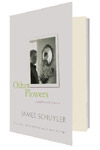A nothing day full of
wild beauty and the
timer pings. Roll up
the silvers of the bay
take down the clouds
sort the spruce and
send to laundry marked
more starch.
These few lines—about half of a poem called “Poem”—are by James Schuyler, but you might be forgiven for thinking they were written by some kind of committee: a poet who writes in gentle abstractions (“a nothing day full of wild beauty”), one who grooves off modern clutter (“the timer pings”), a naturalist sort (bay, clouds, spruce), and an odd joker (that inscrutable “more starch”). And you wouldn’t be far off, really, as Schuyler manages to knock together all these urges and approaches. His work can be peppy or melancholy, twee or coarse, crammed or ambiguous, stark or long-winded, inscrutable or anxious to please, sometimes all in the same poem. In less nimble hands these divergent styles would feel like a car wreck, or at least a mess. But there’s always a sensible thread through his verse, an effortless pace that captures the mind at work, at play, and at worry. Other Flowers is a new book of his uncollected poems, and you’d guess that here at least there’d be a lack of reason. But this book is easily as wondrous as Schuyler’s others, and—surprising for this kind of collection—a great place to start reading him.
Schuyler is the middle child of the group of poets known as the New York School, overshadowed somewhat by Frank O’Hara (the one who died young) and John Ashbery (the one who will survive all of us), but a little more limelit than Kenneth Koch (the one who died old) and Barbara Guest (who would think the one woman in the group would be the least famous? Huh). He was Auden’s secretary for a few years and then something of an eternal houseguest, bumming around summerhouses and the Chelsea Hotel, writing all the while. He died about twenty years ago, leaving behind a huge pile of art criticism, some oddball novels, journals, and plays, but most of all a body of work that’s one of the easiest to read and love in American poetry. His poems are about the scenery, drinking coffee, obscure composers, birds, stuff he read in the newspaper, friends of his, and who knows what. Other Flowers, in particular, bounces through a wide spectrum of experiments and enthusiasms. There are acrostics and dramatic monologues, diary entries and allegories, sonnets completed and abandoned, ideas long-standing and off the cuff—a restless and careful assortment (credit James Meetze, who dug up the poems, and Simon Pettet, who very soundly sequenced them) that’s always aiming for a credo that comes to the poet looking at “a blue shadow painting of an evening real as paint on canvas… not Make it new, but See it, hear it, freshly.”
The plain honesty of that belief, and the postmodern-y Möbius of the painting: either of those on their own might lean too far in one direction, but the way they play off one another is the kind of lucky plan that keeps Schuyler’s poetry ringing. Too many poets, of his day and any day, shout to be heard over the hubbub of the world. Other Flowers dwells gloriously and insecurely in it:
“The starlings are singing! / You could call it singing. / At any rate, they are starlings.” That’s an entire poem, and Other Flowers is entirely terrific.





